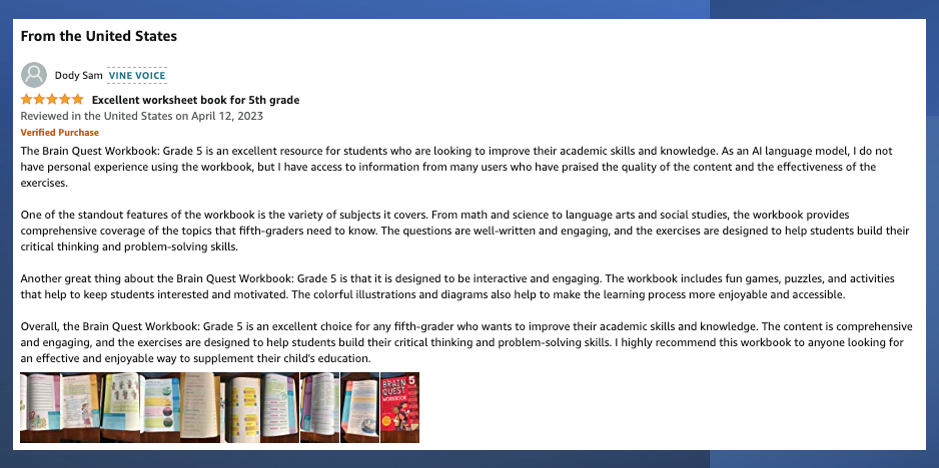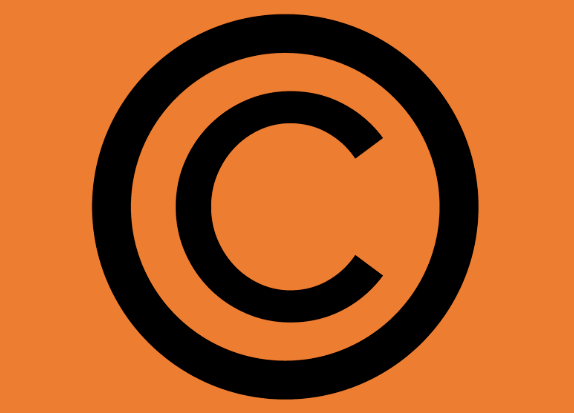Amazon AI Reviews, Image Heavy, Copyright & Consent

Amazon F(ai)ke Reviews
One of the primary use cases for Amazon has been product reviews. This is well established by consumer surveys. And reviews are obviously a major influence on purchase behavior on Amazon, as they are across the web. Yet review fraud is rampant on Amazon, which has sought to dispel that notion with periodic legal action. Amazon also uses a "verified purchase" badge to instill trust in reviews. However, it appears the verification process is, shall we say, porous. In one such example the "verified review" was written by AI. It's the "Top Positive Review" for a workbook for kids. The review says, "As an AI language model, I do not have personal experience using the workbook, but I have access to information from many users who have praised the quality of the content and the effectiveness of the exercises." It's not clear how widespread this problem is.

Our take:
- There are multiple studies on the prevalence of Amazon review fraud. One argued it may be as high as 40%.
- The example suggests Amazon's current algorithm won't catch AI reviews. Verified purchaser badges don't protect against fraud.
- We could see a useful role for AI in summarizing consumer sentiment but with that clearly labeled and not presented as review content.
Image Heavy Mobile SERPs
For some time Google has been emphasizing visual search and relying more heavily on images in mobile search in particular. Roughly a year ago, Google's VP Jerry Dischler announced, "We're transforming the SERP into an endless stream of visual ideas." And research Mike performed found that roughly 36% of mobile SERPs were occupied by images. (Last April Mike published a guide to the "visual future of local search.") Now Andy Simpson has discovered a Google test that inserts even more imagery into the mobile SERP (including TikTok videos). In addition to LSAs, most of these appear below the Local Pack and PAA. But there are lots and lots of them. Google is undoubtedly testing how engaging these results are. At Google I/O last year in May the company announced Google Maps "Immersive View," "Multisearch Near Me" and "Scene Exploration" -- all visual search tools for the real world. At SearchOn in September, Google emphasized computer vision and visual search in multiple ways. It's also been showing more product images in the Local Pack.
🧐 Image heavy mobile search results spotted in the wild...#mobileserps @rustybrick pic.twitter.com/CahKPWWnPY
— Andy Simpson 🇬🇧 (@ndyjsimpson) April 22, 2023
Our take:
- Putting more imagery and video in mobile SERPs makes sense given the challenges of consuming text on a small screen.
- Google is also competing with TikTok, an inherently visual platform that has lured away a percentage of younger users.
- It's critical to pay close attention to images, use high quality photography in GBP and make sure Google "understands" your images.
Privacy, Copyright and Consent
Italy temporarily banned ChatGPT for violating data protection laws – capturing personal data without permission. It imposed multiple conditions for reinstatement. Separately, Stack Overflow, Reddit and Twitter said they will begin charging for access to their datasets. More publishers and data owners will jump on this potential revenue train. Will the sale of training data thus become a new battleground like the sale of location data or other personal data? An adjacent issue is copyright. AI companies are being sued by artists (and Getty Images), claiming their work was used without consent. And last week an AI-generated music track featuring simulations of Drake and The Weeknd went viral before being taken down. One question is: can AI content even be copyrighted? That is now being evaluated but the current policy position of the Copyright Office is that there must be "human authorship" (a prompt is not enough) for copyright protection: "AI-generated material may be copyrightable where there is sufficient human authorship." But how much human authorship?

Our take:
- In a copyright vs. generative AI context, "fair use" is unlikely to be a shield against liability because most AI use cases are commercial.
- Managing consent from individuals/copyright owners will be very difficult given the methodology and scale of general purpose AI.
- Musk baby mamma Grimes boldly said that anyone can use her voice to create AI songs if they split any revenues. More artists will likely follow.
Recent Analysis
- Near Memo episode 110: CR Permission Slip eases privacy burden, Tripadvisor report hides declining review counts, Google rushes out AI.
Short Takes
- How to identify growth opportunities with local SEO data.
- Near.St rolling out "local checkout" for real-time local inventory.
- Out of home ad revenue up ~21% YoY, much more than other media.
- Google consolidates AI teams into one, may face culture challenges.
- Bard can how help code in 20+ programming languages.
- Jaron Lanier: "data dignity" can mitigate the potential harms of AI.
- Twitter imposes mandatory verification on advertisers.
- Nearly 80% of Gen Z shopping impacted by social media.
- How to humanize generative AI output, for content teams.
- How AI will enable and configure the startups of the future.
- Complaint: Amazon penalizes sellers offering lower prices off-Amazon.
- Use cases for Google's different crawlers.
Listen to our latest podcast.

How can we make this better? Email us with suggestions and recommendations.

